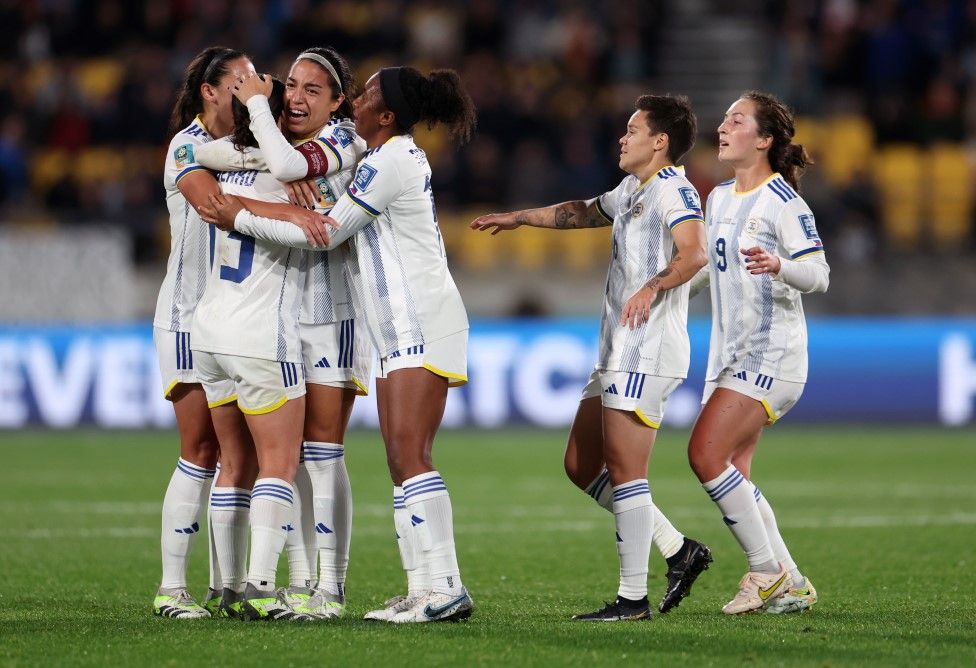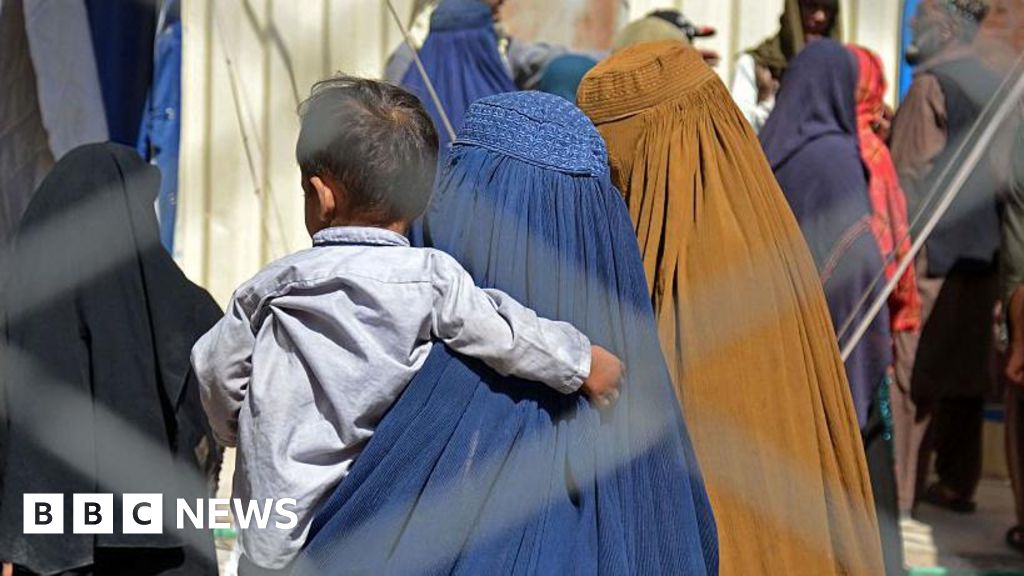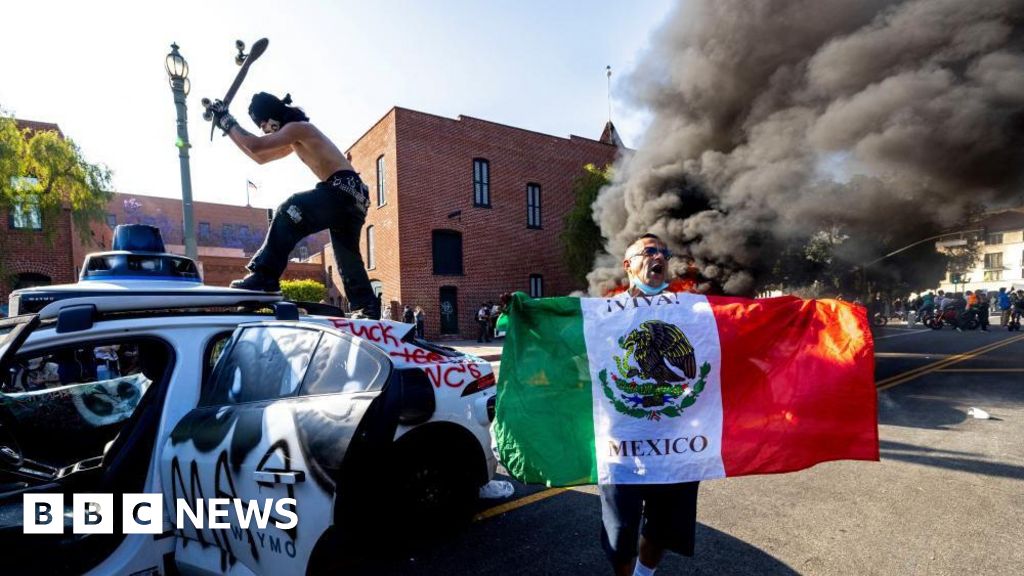ARTICLE AD BOX
 Image source, Getty Images
Image source, Getty Images
The win sparked tears of joy at full time
By Joel Guinto in Singapore & Holly Honderich in Washington
BBC News
One of the shocks of the women's World Cup was Philippines beating co-hosts New Zealand this week. It was a victory forged thousands of miles away, where most of the triumphant team were born.
Sarina Bolden, who made history by scoring her nation's first World Cup goal, waved her country's flag and spoke in Filipino as she dedicated her team's win to her compatriots.
"Para sa bayan," which means "for our country", she told a Filipino news crew after the match in Wellington.
Hearing screams of "Pilipinas" from the crowd will live with me forever, she added.
"I'm just so happy we were able to get this win for you all. People back home in the Philippines, I hope you guys are happy and proud of us. We did this for you guys and to Filipinos globally, around the world, thank you so much for your support. "
Like many of her team mates, Bolden was born in the US. She grew up in California and although her talents caught the eye of the US national youth team system she ended up playing for the country of her mother.
The US flavour of the team did nothing to dilute the joy felt by football fans watching Bolden score her historic goal on a giant screen in one of Manila's swankiest shopping malls.
It was a niche, modestly sized crowd that included the ambassadors of the European Union and New Zealand.
Some were wearing football jerseys as they sang along to the song Noypi from a loudspeaker. Noypi is street slang for Filipino and the song is about the mythical power in the Filipino blood that makes them courageous.
Image source, Getty Images
Image caption,Basketball is massive in Manila, as this Kobe Bryant mural shows
More than 13,000km away, an IT worker in the Chicago area was also tuning in to the history-making match.
"It was crazy, unbelievable," Butchie Impelido told the BBC.
The Philippines-born Mr Impelido is a lifelong football fan. But his connection to the women's national team goes far beyond his interest in the sport.
From his new home in the US, Mr Impelido became an unlikely architect of the women's team. Nearly 20 years ago, in 2005, he saw an article online about Karem Esteva, a Filipino American football star at the University of Virginia.
Something instantly clicked. Could his eldest daughter, a talented Division 1 player, born in the Philippines but raised in the US, also compete for his birth country? The answer turned out to be yes.
His daughter, Angeline, needed convincing, he recalls, laughing. The two flew to Manila so Angeline could join the national team camp, beginning a whirlwind month of travel through southeast Asia and launching a seven-year career with the Philippines.
His youngest daughter, Patrice, then just a high school student, soon followed, playing with the team until 2019.
This made him wonder if there were other American-Filipinos who could get Filipino passports and play for the national team. He started keeping his eye out for people who looked like they might qualify.
"I'm friendly and I have thick skin, so I ask," he said. "My wife keeps telling me 'Don't!' because I've been embarrassed multiple times, but I don't care."
Looking through online football forums, he met Mark Mangune. Together, the two would scour college football rosters, call coaches and search through social media for Filipino-Americans, before reaching out with the strange-sounding proposal: do you want to move to the Philippines?
Image source, Getty Images
"Mark did a lot of the hard work digging through websites," Mr Impelido said. Over time, they compiled a database of nearly 800 possible players.
Today, Mr Impelido and Mr Mangune's fingerprints are all over the national team. When Mr Impelido's daughters started playing, they were two of the only players not born in the Philippines. Now, things have flipped.
Eighteen of the Philippines' 23 World Cup players were born in the US.
The balance has inspired some criticism that so-called "Heritage Players" are taking the spot of born-and-raised Filipinos. It's criticism that Mr Impelido brushes off.
"They're all Filipinos whether they're one quarter, one half or whatever."
On social media, fans also defended the team from criticism and pointed out how women have led the charge for Filipinos in international sport.
Weightlifter Hidilyn Diaz won the Philippines' first Olympic gold medal at the Tokyo 2020 games. Golf prodigy Yuka Saso became the only second teenager to win the US Women's Open in 2021 when she was just 19. Tennis player Alex Eala in 2022 became the first Filipina to win a Grand Slam junior singles title at the US Open.
Internet searches for "Philippines women's national football team" reached a global all-time high after the historic match, according to Google Trends.
Image source, Getty Images
Image caption,Street children playing football
But the Philippines is still a basketball-crazy country, being a former US colony, with boxing also much more popular than football. It is common for every village or residential building in the country to have at least one basketball court.
The Philippine men's football team is also of mixed Filipino lineage, some British, some Middle Eastern. They embraced this biracial heritage with their name, Azkals, a local slang for a mongrel or half-breed dog.
Many of them dated movie stars and beauty queens and were featured in campaigns for giant brands like Adidas. But they have not matched that profile with success on the pitch, never reaching a World Cup and currently ranked 135 by Fifa.
The men's team has yet to experience the adulation the women basked in this week, which will surely go up a notch if they beat Norway on Sunday.
Sara Eggesvik, who provided the winning assist against New Zealand, also spoke in Filipino to thank her countrymen on Philippine television.
She added: "It's crazy how many Filipinos are here. I feel so proud. I feel so glad to be here and show Filipino pride. We're going to fight until the end."

 1 year ago
113
1 year ago
113








 English (US) ·
English (US) ·